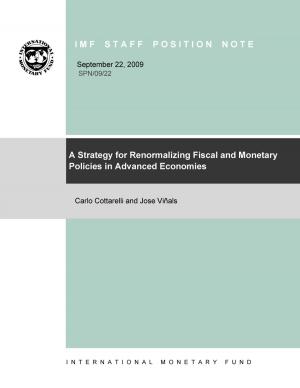Disinflation in Transition: 1993-97
Business & Finance, Economics, Public Finance, Finance & Investing, Banks & Banking, Macroeconomics| Author: | Peter Mr. Doyle, Carlo Mr. Cottarelli | ISBN: | 9781452785301 |
| Publisher: | INTERNATIONAL MONETARY FUND | Publication: | August 23, 1999 |
| Imprint: | INTERNATIONAL MONETARY FUND | Language: | English |
| Author: | Peter Mr. Doyle, Carlo Mr. Cottarelli |
| ISBN: | 9781452785301 |
| Publisher: | INTERNATIONAL MONETARY FUND |
| Publication: | August 23, 1999 |
| Imprint: | INTERNATIONAL MONETARY FUND |
| Language: | English |
The latest in a series of papers published by the International Monetary Fund on economies in transition examines the experience of disinflation in Central and Eastern Europe, the Baltics, Russia, and other countries of the former Soviet Union between 1993 and 1997. The paper reviews the economic policies underlying the dramatic drop in inflation during those years as well as other variables that facilitated the disinflation and notes that the adjustment of fiscal fundamentals as the driving force behind the disinflation, while nominal anchoring arrangements played a less prominent role. This was contrary to developments in countries, for example, in Latin America, that had experienced high inflation for a long period of time.
The latest in a series of papers published by the International Monetary Fund on economies in transition examines the experience of disinflation in Central and Eastern Europe, the Baltics, Russia, and other countries of the former Soviet Union between 1993 and 1997. The paper reviews the economic policies underlying the dramatic drop in inflation during those years as well as other variables that facilitated the disinflation and notes that the adjustment of fiscal fundamentals as the driving force behind the disinflation, while nominal anchoring arrangements played a less prominent role. This was contrary to developments in countries, for example, in Latin America, that had experienced high inflation for a long period of time.















